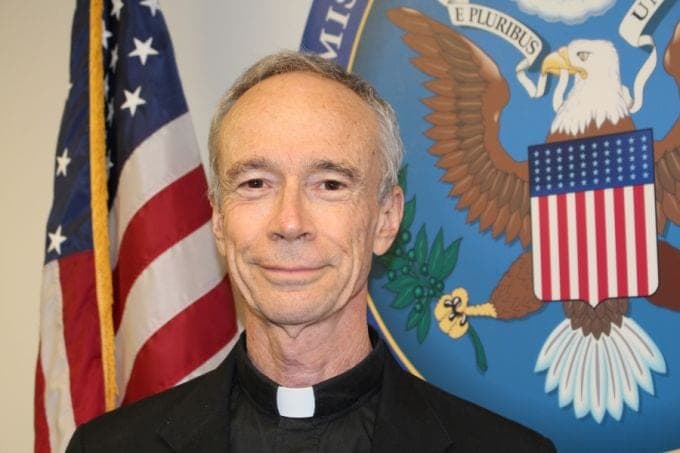ROME — The United States Commission on International Religious Freedom issued its annual report on Wednesday, and said the persecution of religious believers is getting worse across the world.
In particular, the commission said that six new counties be designated as being “countries of particular concern” by the U.S. State Department: Central African Republic, Nigeria, Pakistan, Russia, Syria, and Vietnam.
These countries would join the 10 already so designated: Burma, China, Eritrea, Iran, North Korea, Saudi Arabia, Sudan, Tajikistan, Turkmenistan, and Uzbekistan.
The Commission also placed the following countries on its Tier 2 list: Afghanistan, Azerbaijan, Bahrain, Cuba, Egypt, India, Indonesia, Iraq, Kazakhstan, Laos, Malaysia, and Turkey.
“Overall, the Commission has concluded that the state of affairs for international religious freedom is worsening in both the depth and breadth of violations,” said the chair of the commission, Jesuit Father Thomas Reese.
The release of the report was not without controversy, as the vice-chair of the commission, James Zogby, held a press conference denouncing the commission for not mentioning Israel.
Zogby was joined by Jesuit Father Drew Christiansen, and both claimed members of the commission said they feared they would be accused of anti-Semitism, or even lose funding from the U.S. Congress, if they investigated Israel.
In a dissenting opinion published with the report, Zogby said the commission had an “obligation to consider Israel’s use of religion to discriminate against both its own citizens and Palestinians
living in the occupied territories, as well as its violations of a range of freedoms of Christians, Muslims, and non-Orthodox Jews.”
In a press conference, Reese said the issue of Israel and Palestine can be controversial, and in the end, the commission voted to not include the country in the report.
One region which did get special attention was Western Europe, where the report cited concerns over “government registration requirements and monitoring of disfavored groups pejoratively labeled as “cults” or “sects”; government restrictions on and efforts to restrict certain forms of religious expression (such as places of worship, dress and visible symbols, and parents’ rights); the impact of hate speech and other laws on peaceful expressions of belief; and the impact of counter extremism policies on certain religious communities.”
Answering a question from Crux, Reese said the commission highlighted the region because “we expect Western Europe to be a model of respect and pluralism and respect for religious freedom,” adding “we expect better of” them.
Reese said the commission was particularly concerned about the rise of anti-Semitism and Islamophobia in Europe.
The concern about religious dress, the ability to wear symbols, these are things that frankly I think are causing more unrest and problems by the government interference in people’s expression of their religious views and practices, and I think it something we want our friends in Europe to take a second look at and to think about,” he told Crux, “this is causing a kind of a hostile atmosphere for religious expression in Western Europe, so we are concerned about that. We are concerned because it escalates into discrimination, harassment, and sometimes violence against groups.”
Reese said governments should work to combat religious discrimination, “rather than feeding the frenzy with these kinds of harassments and laws about dress and religious symbols in public places.”
The commission did site improvement in some countries, noting that both Egypt – where Pope Francis is scheduled to visit April 28-29 – and Iraq have taken positive steps to address religious freedom concerns.
The commission also called on the administration of Donald Trump to consider religious persecution in its annual determination of refugee admissions.
It also recommended a renewal of the Lautenberg Amendment, which allow religious minorities in Iran to be processed for resettlement in the United States.
However, Reese was clear he did not support an expedited process for refugees belonging to religious minorities.
“In terms at looking at people who apply for refugee status in the United States, or come as immigrants, we are very much opposed to any religious test or discrimination,” he said, in response to question from Crux.
“We believe that people should be looked upon as human beings who are suffering, and that the United States should be a welcoming place for people who are suffering persecution and are not allowed practice their faith and have been persecuted, in fact, because of their faith,” he continued, “These are people who I think should be considered for refugee status and for immigration.”
He said the commission does not single out any particular religions, but “we are talking about anybody who is persecuted for religious reasons,” which can include members of the majority religion of a country.
Under a law passed last year, the commission is now required to identify non-state actors engaging in particularly severe violations of religious freedom and designate each as an “entity of particular concern.”
The commission therefore for the first time recommended the Islamic State of Iraq and Syria (ISIS) in Iraq and Syria; the Taliban in Afghanistan; and al-Shabaab in Somalia be designated as EPC’s.
Reese said the reasons other entities, such as Boko Haram and Al Qaeda, were not given the designation had nothing to do with their activities, but because they did not have effective control over large areas of territory, which is a condition set forth in the law.
The United States Commission on International Religious Freedom is a bipartisan U.S. federal government commission dedicated to defending the universal right to freedom of religion or belief abroad created in 1998. Its report is separate from the annual International Religious Freedom Report issued by the United States State Department.














